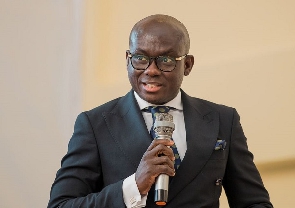The Attorney-General is taking steps to remedy the severe challenges identified with Ghana’s jury system following the verdict of the seven-member jury in the Gregory Afoko and Asabke Alangdi conspiracy to commit murder and murder trial.
The remedy forms part of proposals for amendment of many parts of the Criminal Procedure Laws of Ghana.
“The Attorney-General, hereby, respectively, entreats members of the public, including lawyers, to be guided accordingly and desist from comments, which have an undue tendency to jeopardise the sound and efficient administration of justice.”
This was contained in a statement issued and signed by Godfred Yeboah Dame, the Attorney-General and Minister of Justice following the hung verdict announced by the Jury on Thursday, April 27, on some of the charges against the accused persons.
The jury returned a unanimous verdict on Alangdi on the charge of conspiracy to commit murder but delivered a hung verdict in respect of Afoko.
The accused and the convict were being held on for their involvement in the murder of Adams Mahama, the Upper East Regional Chairman of the New Patriotic Party (NPP) in 2015.
Following the verdict, the court sentenced Alangdi to death by hanging, while it ordered the retrial of Afoko.
“In the instance case, particularly, the verdict of the jury regarding the guilt of the second accused person (Alangdi) for conspiracy to commit murder, whilst at the same time delivering a hung verdict in the case of the first accused on the same charge, highlights the severe challenges with the jury system.”
Afoko and Alangdi were put before the High Court on two counts of murder and conspiracy to commit murder.
“For the offence of murder, the particulars were that the accused persons intentionally caused the death of one Adams Mahama, former Upper East Regional Chairman of the New patriotic Party, by unlawful harm,” the statement said.
“For the offence of conspiracy to commit murder, the particulars disclosed that the two accused persons agreed to act together with a common purpose to commit crime: namely murder.
“Being offences, the punishment for which is death, in accordance with Article 19 (2) of the Constitution, the accused persons were tried by a judge and jury (the jury being the decider of the guilt or otherwise of the accused persons).”
For the offence of murder, the verdict of the jury shall be unanimous. Any verdict of the jury in a case punishable by death, which is not unanimous, is of no effect and means the jury has failed to reach a decision or has resulted in what is popularly described as a “hung jury”.
On Thursday, April 27, 2023, the seven-member jury delivered their verdict as follows:
Firstly, “By a decision of 4-3, accused persons are not guilty of the offence of murder.
By a unanimous decision, the second accused, Asabke Alangdi, was guilty of the offence of conspiracy to commit murder,” it explained.
The statement explained that in accordance with Section 285 (1) of the Criminal and Other offence (Procedure) Act, 1960 (Act 30), the Justice of Appeal, sitting with additional justice of the High Court proceeded to pass the mandatory sentence of death on the 2nd accused.
It said by a decision of 4-3, the first accused Gregory Afoko, was not guilty of the offence of conspiracy to commit murder.
According to the statement, the lack of unanimity in the verdict of the jury regarding the offence of murder, for which both accused persons stood trial and the offence of conspiracy to commit murder in the case of the first accused, Gregory Afoko, dictated that the accused persons must be tried before another jury.
It said: “The laws of Ghana required the accused persons, in the circumstances, to be tried before a new jury. The Republic is bound by same.”
Crime & Punishment of Saturday, 29 April 2023
Source: GNA













